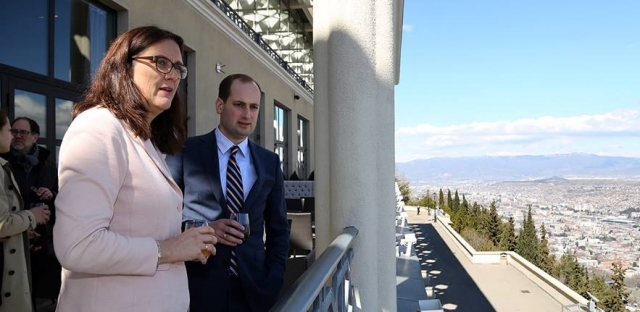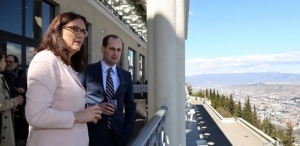Europe’s Malmstrom Launches EU4 Business Week
TBILISI - European Commissioner for Trade Cecilia Malmstrom announced during a round table meeting with representatives of Georgia's business community in Tbilisi on Monday the launch of Brussels’ EU4Business Week.
Running from 21-25 March, EU4Business Week highlights EU support to small and medium-sized businesses and the facilitating Deep and Comprehensive Free Trade Agreement signed between the EU and Georgia in June 2014.
EU4Business aims to bring together all the existing EU’s program that are assisting Georgia in its process towards full economic integration with Europe.
“As the European Union's Trade Commissioner, I'm very pleased to be in a country located on one of the world's oldest trading routes that connected Europe with the Far East,” Malmstrom said.
The Deep and Comprehensive Free Trade Area has strengthened the trade relationship between the EU and Georgia.
The EU is currently the main recipient of Georgia’s exports, receiving 29 per cent of all goods shipped out of the country - an increase of 15 per cent in the first year of the trade agreement.
Total trade between the EU and Georgia amounted to over 2.5 billion euros in 2015.
EU4Business in Georgia embraces a technical and financial assistance package of EU-funded programs worth over GEL 160 million (€62 million) which includes providing assistance to Georgian small and medium-sized businesses as they adapt to EU standards and gives them access to financial and business advice.
"Georgia’s businesses have an enormous potential to develop, especially in light of the opportunities offered by the Deep and Comprehensive Free Trade Area, which gives Georgia access to a market of 500 million consumers,” Malmstrom said.
Malmstrom said the EU plans to invest 410 million euros in Georgia in 2017.
During her visit in Tbilisi on Monday, Malmstrom also met with President Giorgi Margvelashvili, Prime Minister Giorgi Kvirikashvili and other government representatives.
Malmstrom also discussed the EU-Georgia Free Trade Area with students at the International School of Economics (ISET) and Policy Institute (ISET-PI) at Tbilisi State University and a think tank at the University of Tbilisi, as well as with the European Union Georgia Business Council, emphasizing that the last year has seen a major increase in bilateral relations between Tbilisi and Brussels.
“The EU is moving to support Georgia on the question of visa facilitation. In today's world, doing business across borders requires people to move as well as goods” Malmstrom said while speaking to students.
Edited by Nicholas Waller












